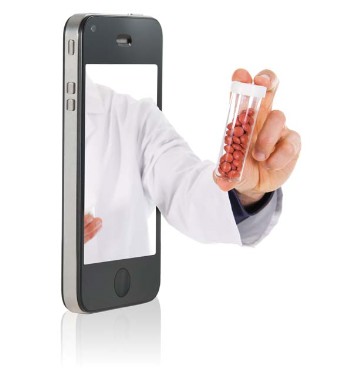User login
NEW ORLEANS – More physicians are using text messaging to communicate with each other and their teams in hospitals, a hint toward a shift from pagers, which have been a regular accessory to scrubs and white coats for the past 30 years.
The trend is driven by the surge in cell phone use and advances in technology, not to mention the new crop of tech-savvy interns and residents, according to the few studies that have focused on text messaging among health care professionals.
The studies are quick to point out one major caveat: Most text messages are not encrypted, and many hospitals and health systems have yet to implement policies and secure programs to protect the exchanged information.
"This is a wake-up call," Dr. Stephanie Kuhlmann said at the annual meeting of the American Academy of Pediatrics. "Hospitals need to be aware of this trend and need to find a way to secure these text messages."
Dr. Kuhlmann, who is a pediatric hospitalist and assistant professor of pediatrics at the University of Kansas, Wichita, doesn’t carry a pager. She receives pages on her cell phone. She uses text messaging with colleagues, residents, and other members of the hospital team, whether it’s for administrative purposes, patient-care issues, or arranging a meetup.
Seeing the trend in her workplace, Dr. Kuhlmann and her colleagues decided to conduct an electronic survey of pediatric hospitalists about their use of text messaging.
The survey revealed that although face-to-face and phone communication were the most common types of contact (92% each) among the 106 surveyed, nearly 60% of the respondents said they received work-related text messages and 12% said they sent more than 10 messages per shift.
The text messages were to or from other pediatric hospitalists 59% of the time, from fellows or residents 34% of the time, and from subspecialists and consulting physicians 25% of the time. Nearly half of the respondents said that they received text messages when they were not on call.
"It’s a quick way to communicate or ask a quick question. You don’t have to stay on hold on the phone," Dr. Kuhlmann said.
Meanwhile, 41% of the respondents said they were worried about violating the Health Insurance Portability and Accountability Act (HIPAA), highlighting a need for text messaging encryption, said Dr. Kuhlmann.
In another survey, conducted by the IT security company Imprivata, more than 60% of hospital IT executives said that they were very concerned about HIPAA compliance.
Roughly 72% of the 114 respondents said that they had policies in place to prevent personal health information from being included in text messages. Yet, some 60% said they didn’t have a secure text messaging solution in place.
Almost two-thirds said that they believed pagers will be replaced by secure text messaging within 3 years.
Imprivata is among a handful of companies to offer HIPAA-compliant or encrypted text messaging programs and software for hospitals and health care systems.
Dr. Kuhlmann said that she wasn’t aware of any head-to-head comparisons for the available encrypted texting programs.
She and her colleagues, who are conducting more studies on the subject, said that there’s a need for more research on the accuracy and effectiveness of text message communication in hospitals and patient privacy issues.
Dr. Kulhmann said she had no relevant financial disclosures.
NEW ORLEANS – More physicians are using text messaging to communicate with each other and their teams in hospitals, a hint toward a shift from pagers, which have been a regular accessory to scrubs and white coats for the past 30 years.
The trend is driven by the surge in cell phone use and advances in technology, not to mention the new crop of tech-savvy interns and residents, according to the few studies that have focused on text messaging among health care professionals.
The studies are quick to point out one major caveat: Most text messages are not encrypted, and many hospitals and health systems have yet to implement policies and secure programs to protect the exchanged information.
"This is a wake-up call," Dr. Stephanie Kuhlmann said at the annual meeting of the American Academy of Pediatrics. "Hospitals need to be aware of this trend and need to find a way to secure these text messages."
Dr. Kuhlmann, who is a pediatric hospitalist and assistant professor of pediatrics at the University of Kansas, Wichita, doesn’t carry a pager. She receives pages on her cell phone. She uses text messaging with colleagues, residents, and other members of the hospital team, whether it’s for administrative purposes, patient-care issues, or arranging a meetup.
Seeing the trend in her workplace, Dr. Kuhlmann and her colleagues decided to conduct an electronic survey of pediatric hospitalists about their use of text messaging.
The survey revealed that although face-to-face and phone communication were the most common types of contact (92% each) among the 106 surveyed, nearly 60% of the respondents said they received work-related text messages and 12% said they sent more than 10 messages per shift.
The text messages were to or from other pediatric hospitalists 59% of the time, from fellows or residents 34% of the time, and from subspecialists and consulting physicians 25% of the time. Nearly half of the respondents said that they received text messages when they were not on call.
"It’s a quick way to communicate or ask a quick question. You don’t have to stay on hold on the phone," Dr. Kuhlmann said.
Meanwhile, 41% of the respondents said they were worried about violating the Health Insurance Portability and Accountability Act (HIPAA), highlighting a need for text messaging encryption, said Dr. Kuhlmann.
In another survey, conducted by the IT security company Imprivata, more than 60% of hospital IT executives said that they were very concerned about HIPAA compliance.
Roughly 72% of the 114 respondents said that they had policies in place to prevent personal health information from being included in text messages. Yet, some 60% said they didn’t have a secure text messaging solution in place.
Almost two-thirds said that they believed pagers will be replaced by secure text messaging within 3 years.
Imprivata is among a handful of companies to offer HIPAA-compliant or encrypted text messaging programs and software for hospitals and health care systems.
Dr. Kuhlmann said that she wasn’t aware of any head-to-head comparisons for the available encrypted texting programs.
She and her colleagues, who are conducting more studies on the subject, said that there’s a need for more research on the accuracy and effectiveness of text message communication in hospitals and patient privacy issues.
Dr. Kulhmann said she had no relevant financial disclosures.
NEW ORLEANS – More physicians are using text messaging to communicate with each other and their teams in hospitals, a hint toward a shift from pagers, which have been a regular accessory to scrubs and white coats for the past 30 years.
The trend is driven by the surge in cell phone use and advances in technology, not to mention the new crop of tech-savvy interns and residents, according to the few studies that have focused on text messaging among health care professionals.
The studies are quick to point out one major caveat: Most text messages are not encrypted, and many hospitals and health systems have yet to implement policies and secure programs to protect the exchanged information.
"This is a wake-up call," Dr. Stephanie Kuhlmann said at the annual meeting of the American Academy of Pediatrics. "Hospitals need to be aware of this trend and need to find a way to secure these text messages."
Dr. Kuhlmann, who is a pediatric hospitalist and assistant professor of pediatrics at the University of Kansas, Wichita, doesn’t carry a pager. She receives pages on her cell phone. She uses text messaging with colleagues, residents, and other members of the hospital team, whether it’s for administrative purposes, patient-care issues, or arranging a meetup.
Seeing the trend in her workplace, Dr. Kuhlmann and her colleagues decided to conduct an electronic survey of pediatric hospitalists about their use of text messaging.
The survey revealed that although face-to-face and phone communication were the most common types of contact (92% each) among the 106 surveyed, nearly 60% of the respondents said they received work-related text messages and 12% said they sent more than 10 messages per shift.
The text messages were to or from other pediatric hospitalists 59% of the time, from fellows or residents 34% of the time, and from subspecialists and consulting physicians 25% of the time. Nearly half of the respondents said that they received text messages when they were not on call.
"It’s a quick way to communicate or ask a quick question. You don’t have to stay on hold on the phone," Dr. Kuhlmann said.
Meanwhile, 41% of the respondents said they were worried about violating the Health Insurance Portability and Accountability Act (HIPAA), highlighting a need for text messaging encryption, said Dr. Kuhlmann.
In another survey, conducted by the IT security company Imprivata, more than 60% of hospital IT executives said that they were very concerned about HIPAA compliance.
Roughly 72% of the 114 respondents said that they had policies in place to prevent personal health information from being included in text messages. Yet, some 60% said they didn’t have a secure text messaging solution in place.
Almost two-thirds said that they believed pagers will be replaced by secure text messaging within 3 years.
Imprivata is among a handful of companies to offer HIPAA-compliant or encrypted text messaging programs and software for hospitals and health care systems.
Dr. Kuhlmann said that she wasn’t aware of any head-to-head comparisons for the available encrypted texting programs.
She and her colleagues, who are conducting more studies on the subject, said that there’s a need for more research on the accuracy and effectiveness of text message communication in hospitals and patient privacy issues.
Dr. Kulhmann said she had no relevant financial disclosures.
AT THE ANNUAL MEETING OF THE AMERICAN ACADEMY OF PEDIATRICS
Major Finding: Nearly 60% of survey respondents said they received work-related text messages, and 12% said they sent more than 10 messages per shift.
Data Source: This was an electronic survey about text messaging among 106 pediatric hospitalists.
Disclosures: Dr. Kulhmann said she had no relevant financial disclosures.

